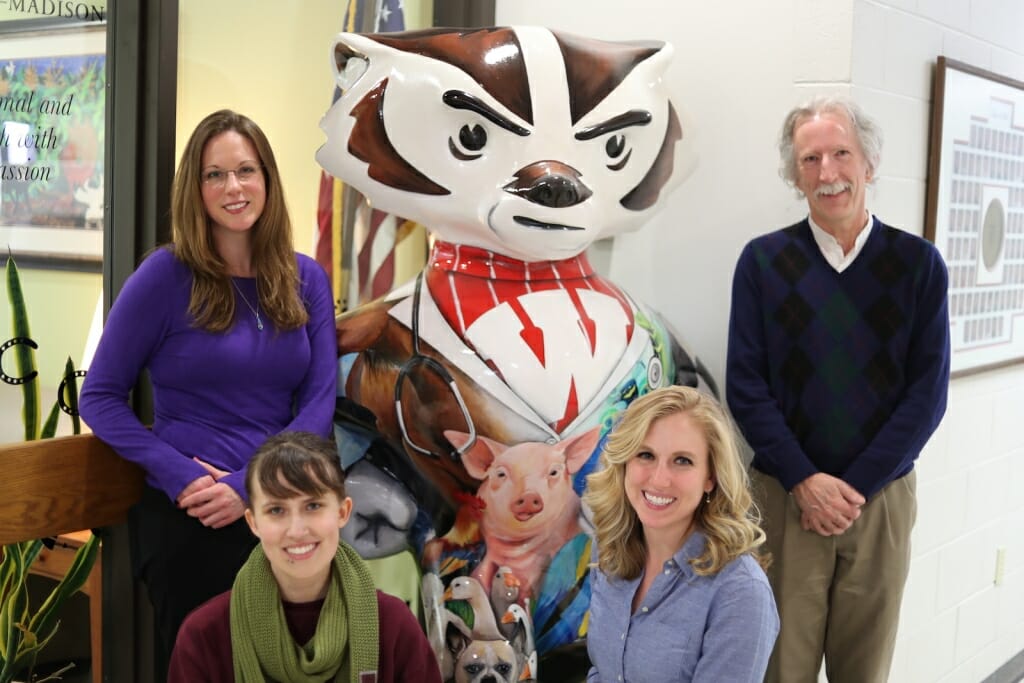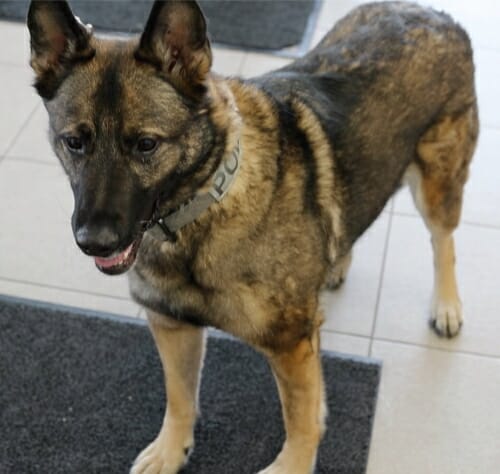After winning online vote, researchers to assemble German shepherd genome

From left to right, UW School of Veterinary Medicine Comparative Genetics Research Laboratory members Susannah Sample, Jordan Gruel, Emily Binversie and Peter Muir. Not pictured: Lauren Baker. UW-Madison
The UW–Madison School of Veterinary Medicine tapped its resourcefulness and humor to get a grant in an unusual way: by winning an online vote among six finalists.
VetMed’s Comparative Genetics Research Laboratory will use the award, valued at up to $50,000, to assemble the genome of a German shepherd for the first time and to research diseases affecting the breed.
The VetMed project received 24 percent of almost 13,000 votes placed in the grant competition hosted by Pacific Biosciences. To draw attention to its project, the lab had created a light-hearted video that features a German shepherd mix from the UW–Madison Police Department.
Researchers in the Comparative Genetics lab study genetic diseases that affect dogs, which can serve as models for similar diseases in humans. They also study genomic variation between dog breeds to better understand breed-specific traits and diseases.
This genome will allow the group to expand its research into diseases that affect German shepherds, starting with fibrotic myopathy. It will also contribute to further understanding of structural variation between the genomes of different dog breeds.
A crippling disease, fibrotic myopathy causes muscle contracture and pain, leading to hind limb lameness and an abnormal gait. In dogs, the disease chiefly affects German shepherds, and there are no successful treatment options. The disease also affects horses and is similar to congenital torticollis, a condition of muscle contraction that affects between 0.3 to 0.5 percent of infants.
“This sequencing will be an important first step to discovering the underlying genetic basis of fibrotic myopathy,” says Susannah Sample, an assistant professor in the Department of Surgical Sciences at the SVM.
Sample and Peter Muir, the Melita Grunow Family Professor of Companion Animal Health, serve as principal investigators in the Comparative Genetics lab. Other lab members include Lauren Baker and Emily Binversie, both SVM graduates undertaking PhD training, and technician Jordan Gruel.
The lab filmed the video for the competition throughout the School of Veterinary Medicine and the school’s teaching hospital, UW Veterinary Care. It features a number of animal guests, including a cameo by UWPD police dog Maya and her partner, Sgt. Nic Banuelos.
Sample says the assembly of a reference genome for the German shepherd will be a major contribution to canine genetic research and to veterinary medicine at large.
“We’re so grateful for the enthusiastic response to our research and we look forward to learning more about this beloved breed,” she says.
California-based Pacific Biosciences provides genomic analysis systems for scientists.

